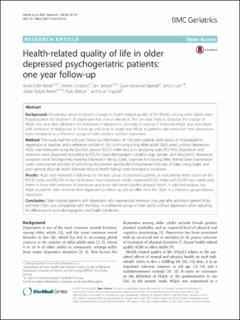Health-related quality of life in older depressed psychogeriatric patients: one year follow-up
Helvik, Anne-Sofie; Corazzini, Kirsten; Selbæk, Geir; Björklöf, Guro Hanevold; Laks, Jerson; Saltyte Benth, Jurate; Østbye, Truls; Engedal, Knut
Peer reviewed, Journal article
Published version

Åpne
Permanent lenke
https://hdl.handle.net/11250/2648530Utgivelsesdato
2016Metadata
Vis full innførselSamlinger
- Institutt for samfunnsmedisin og sykepleie [3640]
- Publikasjoner fra CRIStin - NTNU [38062]
- St. Olavs hospital [2505]
Sammendrag
Background
Knowledge about long-term change in health related quality of life (HQoL) among older adults after hospitalization for treatment of depression has clinical relevance. The aim was firstly to describe the change of HQoL one year after admission for treatment of depression, secondly to explore if improved HQoL was associated with remission of depression at follow-up and lastly to study how HQoL in patients with remission from depression were compared to a reference group of older persons without depression.
Method
This study had the one year follow-up information of 108 older patients (≥60 years), all hospitalized for depression at baseline, and a reference sample of 106 community-living older adults (≥60 years) without depression. HQoL was measured using the EuroQol Group’s EQ-5D Index and a visual analog scale (EQ-VAS). Depression and remission were diagnosed according to ICD-10. Socio-demographic variables (age, gender, and education), depressive symptom score (Montgomery-Aasberg Depression Rating Scale), cognitive functioning (Mini Mental State Examination scale), instrumental activities of daily living (the Lawton and Brody’s Instrumental Activities of Daily Living Scale), and poor general physical health (General Medical Health Rating) were included as covariates.
Results
HQoL had improved at follow-up for the total group of depressed patients, as indicated by better scores on the EQ-5D Index and EQ-VAS. In the multivariate linear regression model, improved EQ-5D Index and EQ-VAS was significantly better in those with remission of depression and those with better baseline physical health. In adjusted analyses, the HQoL in patients with remission from depression at follow-up did not differ from the HQoL in a reference group without depression.
Conclusion
Older hospital patients with depression who experienced remission one year after admission gained HQoL and their HQoL was comparable with the HQoL in a reference group of older adults without depression when adjusting for differences in socio-demographics and health conditions.
